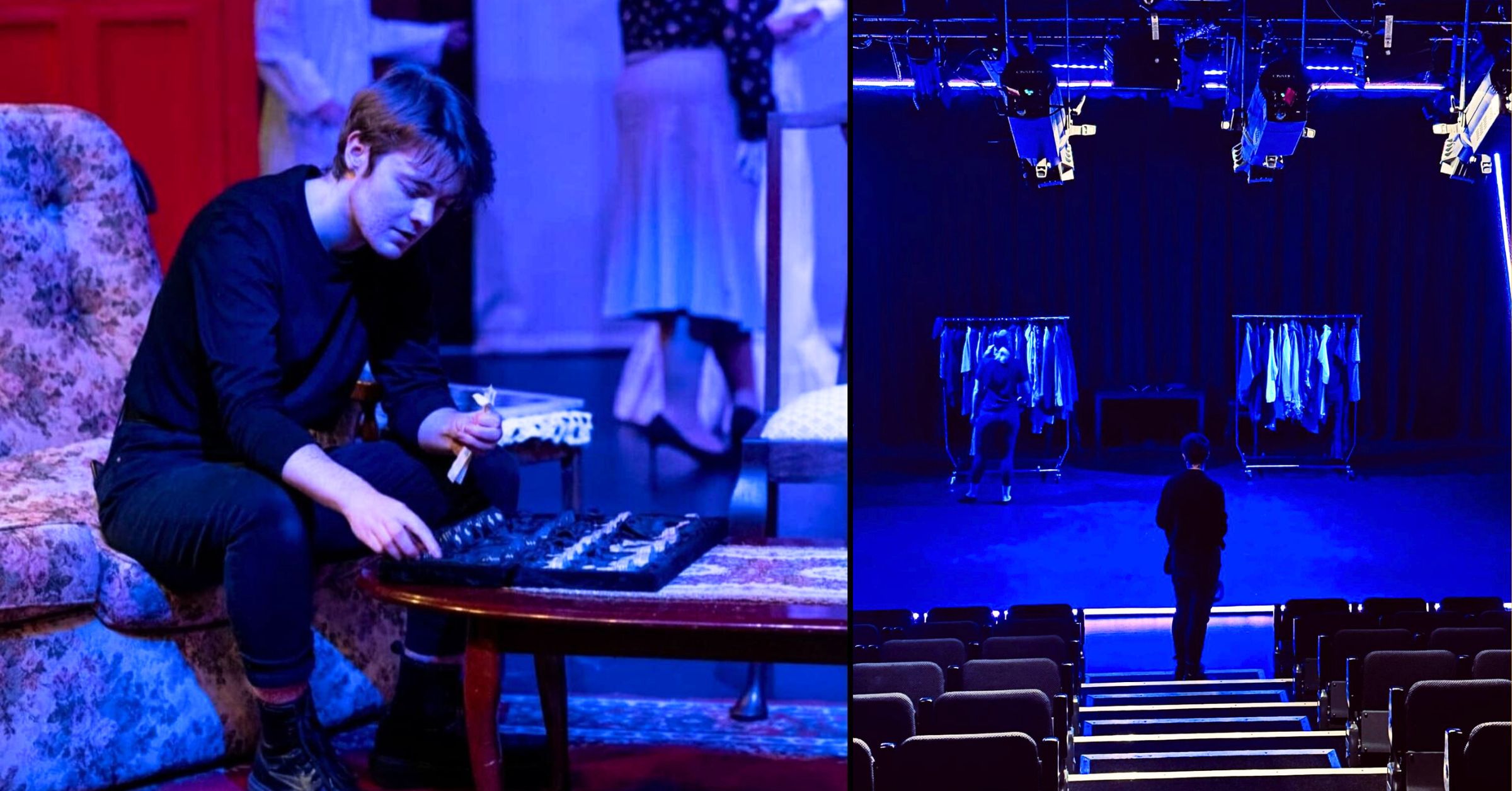Dylan McBurney offers tips and advice for the workplace, based on their experience as a professional stage manager with disability.
In 2017, I was performing in a theatre in Geelong, and first felt an inexplicable certainty that the nagging pain in my neck would become a problem.
Five years later, I closed my first professional show, The Golden Cockerel, at the Festival Theatre in Adelaide. Each day on that production ended with intense, widespread pain. The day after we closed, I was diagnosed with fibromyalgia – a chronic pain condition that triggers constant pain without a physical cause, and impacts my mobility, energy and muscle strength.
Being disabled in the theatre industry isn’t easy. While we’re slowly starting to see more representation on our stages and screens, this shift takes longer behind the scenes. I learned a lot about access and inclusion in my first few years as a stage manager though, and I will share my advice and experiences here. I hope you learn something from it, stage manager or otherwise.
Lay out your access needs from the get-go and impose firm boundaries
When I’m asked to work on a project, I send through my access needs in my first email, letting the company know I can’t assist with lifting and set movement or stand for long periods, and I need a good chair and table to work at (you would think this is a given, but not always!).
On one show, I requested a rolling chair for the days when we were plotting lighting cues. While I can imagine the Tony Award-winning set designer wasn’t happy seeing wheelie chairs on his beautiful stage, it allowed me to complete the duties of my role that I had previously struggled with.
As a people pleaser in my day-to-day life, getting to prioritise myself and my needs in the theatre is very cathartic.
Never make assumptions
Determine what your role is, in detail. Stage managers tend to have a wide range of responsibilities, and take on extra tasks where no one else will, so I like to establish what’s my jurisdiction and stick to it.
Confirming the accessibility of the rehearsal venue and theatre is also essential. I’ve signed on to projects with stairs and even a ladder leading to the stage management desk. Despite the regularity with which I share my invisibly disabled identity, I am often assumed to have no access needs, and make sure to challenge this when I must.
Make your job as easy for yourself as possible
Recently, I operated lighting for a show and got a sore back from how I was positioned. The next day, I reconfigured my desk so the button was closer. It seems obvious, but constantly asking yourself what you can do to create a more accommodating work environment is a great skill to develop.
(Bonus: As a people pleaser in my day-to-day life, getting to prioritise myself and my needs in the theatre is very cathartic.)
Delegate!
Remember, when you are in a management role, your job is to make sure everything gets done, not to do it all yourself.
Lists are your best friend!
In theatre, one tiny oversight can snowball into a big problem. A great way to mitigate this, if you experience brain fog or memory issues because of your disability, is to take notes and make sure you come back to them.
Having checklists you can physically cross off also helps reduce the anxiety that strikes when the lights go down at the top of the show and you suddenly worry you’ve forgotten something. Finding the little tricks that work for you are an essential process in any career, and I’m constantly learning.
The most valuable thing I’ve learned, is that myself and my disability are a package deal. My disability is not a shadow cast over me, or a handicap I have been afflicted with, but one small part of who I am.
Take no shit
As a disabled person, I am not always afforded the same respect as my non-disabled peers, so sometimes I have to go the extra mile. Being firm and assertive, while staying respectful and polite, is how I get my voice heard and the job done. While the ‘I told you so’s throughout my career have been very satisfying, they shouldn’t have had to happen if my concerns were heard and valued in the first place.
Running behind time and someone is having an irrelevant conversation? Tell them to park it and get things moving again.
While it may seem daunting, you gain respect by taking charge and making sure there’s enough time for what’s important – especially getting everyone home on time.
Practice self-care
Being in pain is a constant in my life, and learning that it isn’t normal was, and still is, a journey. Giving myself permission to care for myself is a skill I’m learning to apply throughout my life, not just work.
Having medication, snacks and water close by, and checking in regularly with myself, doesn’t only benefit me, but the people I work with. If you haven’t had a snack and a drink in a while, chances are everyone else is feeling peckish too. I am guilty of sitting in swelteringly hot rehearsal rooms, completely oblivious to the discomfort until someone finally asks me to turn on the AC.
Following my diagnosis, I worried I would never be able to work as a stage manager. Continuing my career has been so rewarding, and I feel grateful for everyone that has supported me.
The most valuable thing I’ve learned, is that myself and my disability are a package deal. My disability is not a shadow cast over me, or a handicap I have been afflicted with, but one small part of who I am. The right colleagues see that I am also passionate, dedicated, caring, and a pretty awesome stage manager, and that is what’s important.
This blog was written as part of CYDA’s DREAM Employment Network. You can find out more about the Network here.

About the author:
Dylan (they/them) is a trainee at CYDA. They bring their lived experience of being transgender and disabled to their work, as well as their perspective as a young person. Outside of CYDA, Dylan studies at RMIT, and stage manages and produces independent theatre.


